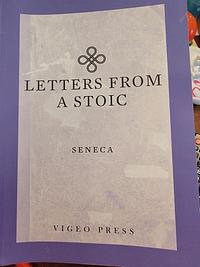You need to sign in or sign up before continuing.
Take a photo of a barcode or cover
challenging
informative
inspiring
reflective
slow-paced
funny
informative
inspiring
reflective
medium-paced
inspiring
medium-paced
challenging
inspiring
reflective
medium-paced
challenging
emotional
hopeful
informative
inspiring
reflective
slow-paced
This was my first book on Stoicism, and I absolutely loved it. Seneca touches on a wide range of topics, and I often found myself thinking about what I’d read hours, sometimes even days, later. Some passages will probably live rent-free in my head forever. The historical aspect was surprisingly interesting as well; in some letters, he gives insight into daily life in ancient Rome.
That said, there were also many things I disagreed with - either because they're simple outdated (e.g. everything he said about slavery) or his ignorance and lack of empathy and understanding for certain topics (like poverty).
But I think, that's exactly what that makes this book valuable: It challenges the reader. It makes you think, it makes you pause to reflect on what you just read and the world you live in.
That said, there were also many things I disagreed with - either because they're simple outdated (e.g. everything he said about slavery) or his ignorance and lack of empathy and understanding for certain topics (like poverty).
But I think, that's exactly what that makes this book valuable: It challenges the reader. It makes you think, it makes you pause to reflect on what you just read and the world you live in.
reflective
"Life is the gift of the immortal gods, but ... living well is the gift of philosophy."
Seneca offers the greatest wisdom of Stoic philosophy in about 100 letters. There is so much in here it is amazing, starting off with life advice from Seneca and other Stoic philosophers on...
-Death
-Decision-making
-Friendship
-Learning
-Mental health
-Morality & virtue
-Wealth
As a bonus, you also get glimpses into ancient Greco-Roman culture through Seneca's critiques on popular behavior and lifestyles. This is one of my favorite ancient texts, and it is my favorite book that I have read on Stoic philosophy so far–ancient or modern.
Seneca offers the greatest wisdom of Stoic philosophy in about 100 letters. There is so much in here it is amazing, starting off with life advice from Seneca and other Stoic philosophers on...
-Death
-Decision-making
-Friendship
-Learning
-Mental health
-Morality & virtue
-Wealth
As a bonus, you also get glimpses into ancient Greco-Roman culture through Seneca's critiques on popular behavior and lifestyles. This is one of my favorite ancient texts, and it is my favorite book that I have read on Stoic philosophy so far–ancient or modern.
reflective
slow-paced
While a great text deserving of being placed in the Stoic trilogy of famous writings, this certainly is the weakest link of the three books. Epictetus' Discourses & Selected Writings was great at explaining the principles, fundamentals, workings, and resultant character development, and served as he lived, the great tutor of the Stoics. Marcus Aurelius in his Meditations breathed life into Epictetus' principles, showing the human struggle with Stoicism, vice, greed, and most notoriously for Aurelius, anger. It is said that Marcus Aurelius' biggest struggle was to day by day never become a tyrant, and it is thanks to Stoicism that that was upheld. While Seneca does a little bit of both in his letters to Lucilius, he doesn't really impart what I believe to be a lasting effect akin to the aforementioned masterpieces. Seneca is highly tangential and very judgemental despite his proclamation of having an open mind. (Credit where is due, he was very forward-thinking in terms of slavery and gladiatorial fights) He is also a rather clouded figure in his relation to Stoicism, for despite his claims of being very in tune with his teachings - and despising those who preach but do not practice - he was quite the hypocrite. He had a supposed multi-year affair with an Emporer's sister, was very wealthy, and held himself quite highly in some cases. He also was very contradictory in some of his letters. This isn't a net negative for the man, for it shows that the Stoics themselves aren't perfect and those great writers of the trilogy were still ultimately human; Seneca lusted, Aurelius was prone to anger, Epictetus in grief of his being lame. Despite all of this, they still developed into shining beacons of virtue and imparted vital knowledge for centuries beyond their passing. Seneca specifically is fantastic for quotations and has made great contributions not in personable writings like Aurelius, or austere teachings like Epictetus, but in memorable and hard-hitting quotes. Seneca for all of his faults is an essential part of Stoic literature, and despite being the weakest link, is still an incredible spokesperson for the Stoic philosophy.
reflective
tense
medium-paced
Starts off solid and gradually gets slower. Bangers throughout but definitely higher concentration at the start.




